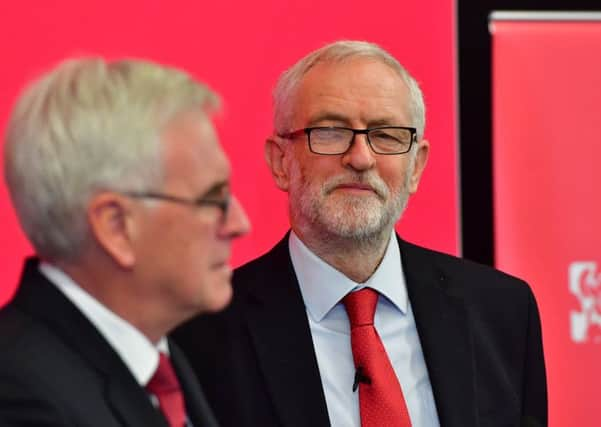Bill Jamieson: We may have reached ‘peak promise’ in the elections


Promises running to hundreds of billions have rained down. Voters have struggled to keep up with the near-daily announcements of new pledges. The costs would be met by higher taxes on the better off, a big hike in corporation tax paid by businesses – and, over time, higher revenues flowing from investment-led economic growth.
As if all this was not enough, Labour’s shadow chancellor John McDonnell has thrown in an additional £58 billion to compensate female pensioners born in the 1950s for losing early pension rights.
Advertisement
Hide AdAdvertisement
Hide AdAll told, this is the biggest package of spending boosts and benefits offered to UK voters in living memory. It should surely knock Brexit into second place as an election issue and put Labour on course for a landslide victory on 12 December. But instead, opinion polls show support for the party trailing the Conservatives – whose manifesto has been widely described as overly cautious, uninspiringly modest and lacking in ambition.
Might it be because voters feel the Labour manifesto does not offer enough? That the scale of Labour’s transformative ambitions is too radical? That other issues such as Brexit and here in Scotland a second independence referendum are rated more important? Or that the hundreds of billions being offered are simply not credible?
Whatever the reason, the massive spending promises look to have hit a law of diminishing returns – that the more that is offered, the less believable they have come to sound for voters.
The thinking behind such commitments is that the more material benefits a party can offer the electorate, the more votes it will hoover up. Do we not invariably act in our own self-interest and respond to those fat juicy carrots dangled before us? Yet barring a major surge in support in the closing ten days of the campaign, the best Labour can hope for is a hung parliament, denying Boris Johnson’s Conservatives an overall majority.
We may have grown inured to such generous pledges in the heat of an election campaign: a weary scepticism has long been the default response of many. Or we could put this down to a more savvy electorate, reluctant to accept a spending promise at face value unless it is fully costed, the arithmetic validated by independent bodies such as the Institute for Fiscal Studies, and seen to be deliverable without a massive surge in borrowing, debt – and taxes.
Voters with long memories will recall that we do not have a good track record in sustaining election booms. Labour’s spending surge in the mid-1960s ended with inflation and devaluation; the Tory “dash for growth” under chancellor Tony Barber ended with the oil price surge and rampant inflation; the Nigel Lawson boom of the mid-1980s with bust and a sharp recession; the Gordon Brown spending splash with the banking crisis. Every attempted fiscal break-out over the past 50 years has ended in curtailment and retreat: we are barely on the sunny uplands before the clouds descend.
As it is, we seem to have succumbed to “billions fatigue”. Even after a decade of crimped public spending and desire for change, the 2019 election may come to be remembered as a turning point for the politics of sky’s-the-limit promises: massive spending pledges are not enough.
Concern grows over business rates
Scotland’s army of small firms should be in the front line of beneficiaries from an uplift in infrastructure spending. But the predominant concern today is over proposed changes to business rates.
Advertisement
Hide AdAdvertisement
Hide AdTens of thousands of small businesses could face big business rates hikes as a consequence of a decision made by the Scottish Parliament’s Local Government committee. Opposition MSPs, including, strangely, the Conservatives, united to force through a Stage 2 amendment to the Non-Domestic Rates (Scotland) Bill that could see councils take full control of the Scottish rates system. The change, warns the Federation of Small Businesses, may end Scotland-wide small business and charitable rate relief.
Stuart Mackinnon, FSB’s external affairs manager for Scotland, said: “This Bill is supposed to be looking at new ways to make the rates system more user-friendly and introduce more frequent revaluations. Instead, we see a policy adopted which could cost businesses far more than the tourism tax or the workplace parking levy. At the earliest opportunity parliamentarians must put this significant Bill back on track.”
The FSB joins the Scottish Retail Consortium in expressing alarm over the change. SRC director David Lonsdale says: “With shops under enormous pressure, action is needed to reduce rates bills, now at a 20-year high.
“However, allowing each of Scotland’s 32 councils to set the poundage rate in their area is an alarming and retrograde step, and flies in the face of the Bill’s aims and the thrust of the rates reform agenda. Councils are already able to reduce business rates in their area, but only three have ever bothered to do so. Handing councils control over the poundage rate could lead to firms being treated like cash cows, pushing business rates up even higher and further hitting competitiveness.”
There is no simple solution to the business rates problem. Clearly businesses large and small should pay towards the maintenance of local infrastructure – roads, lighting, street cleaning and maintenance together with traffic management.
But the combination of rising business rates and the relentless surge of online retail is working to denude high streets and town centres. Context here surely merits consideration. But the debate on the amendment last week was marked by an almost complete lack of any discussion as to what this amendment might mean for ratepayers. In Northern Ireland, where councils have a hand in setting rates, rates bills are more than 20 per cent higher than here.
Holyrood needs to weigh carefully changes in legislation that may make this dire situation even worse. Second thoughts here are surely due.